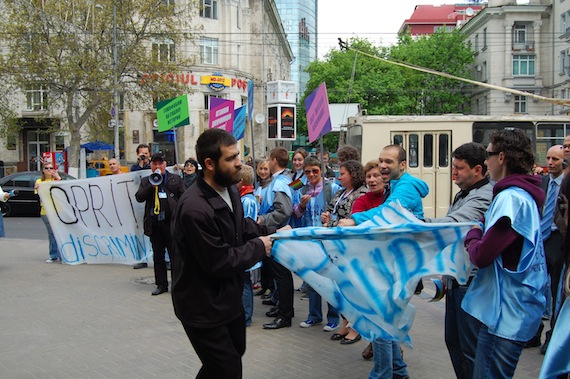
Singer and actor Ricky Martin and UN Secretary-General Ban Ki-moon (photo credit: UN/Rick Bajomas)
The UN recently launched an unprecedented global campaign to support LGBT equality in an event in Cape Town. Called "Free and Equal," the campaign aims to change attitudes across the globe using the power of social media, creative content and celebrity ambassadors. The celebrities already backing the campaign include Ricky Martin, South African singer and "Princess of Africa" Yvonne Chaka Chaka, Bollywood actress Celina Jaitly, and Brazilian hit maker Daniela Mercury.
Championing this campaign and fueling the rapidly increasing momentum at the UN for LGBT rights is Charles Radcliffe, the head of the global issues section at the UN human rights office in New York.
In this interview Charles talks about the big strides that countries around the world have made on this issue in the last decade, the present-day LGBT rights map of the world, which still looks like a "patchwork quilt," and where he thinks we will (and can) be a decade from now.
What we see in the media about the UN's involvement in the issue is only part of the story. Charles talks about how "behind-the-scenes diplomacy" -- private meetings with governments in New York, Geneva and elsewhere -- is creating pressure for legislative reform. It has been a rocky road, but the results are evident: The number of countries to come out against LGBT rights violations has grown from 32 to 85 in a span of just over five years!
Nish Gera: It seems that LGBT rights are a relatively recent focus for the UN. Tell us about how the shift happened and when.
Charles Radcliffe: The public debate is new, but concerns about violence and discrimination against LGBT people have been filtering through the UN human rights system for many years.
Since the year 2000, allegations of human rights abuses against LGBT people began to be cited with increasing frequency by UN human rights rapporteurs. More recently, the Human Rights Council's peer review process has provided another platform for complaints to be aired. The voices of LGBT activists -- empowered and connected as never before thanks to the Internet and social media -- have also made themselves heard at the UN, including at many informal meetings organized by supportive states.
In 2010, the issue was given a boost when Secretary-General Ban Ki-moon and his human rights chief Navi Pillay appealed publicly for the worldwide decriminalization of homosexuality and other reforms to protect the rights of LGBT people. Their leadership is helping to bring the issue into much sharper focus at the UN, both in public settings and in private meetings.
But perhaps the most crucial factor has been a shift in the underlying balance of opinion among states. As recently as 2005, only 32 countries were willing to sign onto a statement at the UN expressing concern at LGBT rights violations. That number grew rapidly, to 54 in 2006, 67 in 2008 and 85 in 2011. I cannot think of any issue on which opinion among states has moved so quickly and so dramatically.
That last headcount in 2011 arguably marked a tipping point, the moment when, for the first time, more countries than not wanted to see action taken. Once we were there, the way was clear for the Human Rights Council to take up the issue. In mid-2011, the Council adopted the first UN resolution. It expressed grave concern at violence and discrimination against LGBT people and set in train an exploratory process of reporting and debate.
Delegates request the floor during the Human Rights Council's panel discussion on discrimination and violence based on sexual orientation (photo credit: UN/Violaine Martin)
Gera: We often hear a lot about the progress on LGBT rights in the U.S. and Western Europe through the media. How does the map on LGBT rights look for the rest of the world?
Radcliffe: It's a patchwork quilt, as it is on almost any human rights issue. It's true that the trends in the U.S. and Western Europe are largely positive, in terms of changes in both the legal framework and social attitudes. But other regions have also progressed. Latin America has seen enormous improvements, with new anti-discrimination measures, anti-homophobia campaigns and marriage equality in two countries (Argentina and Uruguay). The new law on gender identity in Argentina is a model for the rest of the world.
There are some signs of progress in Asia too. Nepal, Pakistan and India all issue third-gender identity cards, albeit with varying conditions attached. Thailand is debating civil partnerships for same-sex couples. A debate on gay rights is unfolding in India after the courts struck down a colonial-era provision that penalized same-sex relationships.
Even in Africa, which has generated more than its share of bad news for LGBT people, there are glimmers of hope. South Africa, in spite of high levels of homophobic violence, remains a beacon in the region, with strong constitutional and legal protections. Elsewhere, as a new generation of leaders emerges, there is tentative talk in several countries of reviewing criminal laws and rethinking attitudes. If you look beneath the surface in Africa, even in places where politicians and the media are most hostile, you find a rising activism on the part of the LGBT community and its allies, joined in some places by national human rights commissions.
Of course, there are bleak spots: In a third of the world's countries, homosexuality is still criminalized; in seven countries, the death penalty may be applied. Draft laws in Uganda, Nigeria and Liberia would strengthen existing penalties for homosexuality and ban LGBT organizations from operating. In parts of Eastern Europe, activists are prevented from holding marches or organizing public gatherings.
But dividing the world between good pupils and bad is an oversimplification. In the end, all countries are embarked on the same journey on this issue -- albeit traveling at different speeds and facing their own obstacles along the way. Change, when it comes, can unfold quickly. Fifty years ago, gay relationships were still criminalized in much of Europe. Twenty-five years ago, the Thatcher government in Britain banned schools from stocking books that contained information on same-sex relationships. Look at how far things have changed for the better since then!
All countries need to do more. There are gaping holes in anti-discrimination laws. In more than half of U.S. states, for example, employers can still fire workers for being gay and face no legal consequences. Many transgender people in Europe are forced to undergo sterilization if they want their gender identity to be officially recognized. Homophobic bullying of children and violent hate crimes are a problem everywhere.
Gera: More specifically, where and how has positive change happened in the last 10 years?
Radcliffe: Few would have predicted it 10 years ago, but the big story in many Western and some Latin American countries has been marriage equality. It's a cause that has struck a chord, especially among younger people, gay and straight alike. It has also helped to present gay and lesbian people in a new light: Everyone can relate to the human need for love and mutual commitment.
But the marriage equality movement is culturally specific, not global. In many parts of the world, LGBT activists will tell you they are fighting for other things: a lifting of criminal sanctions, better access to health care, an end to workplace discrimination and, above all, public education to encourage people to rethink their attitudes and treat LGBT people with the respect they deserve. And if you step back and look for trends from the past 10 years, it is in these areas that you find some of the most significant changes.
LGBT pride parade in Moldova with UN monitors present (photo credit: OHCHR/Claude Cahn)
Gera: Tell us about some of the recent successes for the UN on LGBT rights.
Radcliffe: The most visible change at the UN is that everyone is now talking about LGBT rights. Senior UN figures, from the secretary-general down, are shaping the debate -- condemning violence and discrimination and pressing states to accelerate reforms. In the space of a year, we had the first UN resolution, the first official UN report and the first formal UN debate on the issue.
A lot also happens out of sight. The UN is increasingly active in raising LGBT-related human rights concerns in private meetings with governments -- in New York, Geneva and in the field. This kind of behind-the-scenes diplomacy can yield real results, both in individual cases (securing the release of jailed activists, for example) and in helping to generate pressure for legislative reforms. It also helps to "normalize" the issue: Rights violations affecting LGBT people are gradually becoming a routine subject for the UN's human rights institutions, approached in the same way as rights violations against other minorities.
Gera: What do you consider as limitations on what the UN can and cannot achieve on this issue?
Radcliffe: One of the most powerful instruments available to the UN is international human rights law. The commitments that governments make when they ratify human rights treaties are legally binding. The challenge is enforcement: The UN cannot make countries do what they don't want to do. There are no special forces at the secretary-general's command that he can send in to require a government to decriminalize same-sex relationships or oblige a parliament to amend anti-discrimination laws to protect LGBT people.
Often the best we can do is to document abuses, voice concerns -- sometimes privately, if that is the best way to be heard, sometimes publicly -- and urge countries to take corrective action when they veer away from international human rights standards. We can also stand in solidarity with activists on the ground. Sometimes it helps if hostile states know that local LGBT human rights defenders have the UN at their side.
Gera: Given how accelerated the pace of progress is today, what is your vision for 10 years down the road? How will it feel to be gay or trans in 2023?
Radcliffe: Social change is speeding up in part thanks to social media, which is bringing hundreds of millions of people into contact with human rights activism in ways that could hardly have been imagined a decade ago. It is a trend that will only be reinforced further in the coming years.
We talked before about the patchwork world map. Another way to look at it is an expanding safety zone -- whole swaths of territory where life is getting to variable degrees better for LGBT people. Over the next 10 years I am confident we will see this safety zone expand, encompassing an ever larger area. Inside it, LGBT people will enjoy greater protection and social acceptance. The big question is: What about those outside it?
Countries cannot wall themselves off from change. Progress will eventually reach all parts. But as we move forward, expect setbacks; it is a familiar pattern. The backlash is already evident in Russia, parts of Africa and Eastern Europe, where politicians are proposing draconian new restrictions and painting LGBT people as a threat to children and society. But backlashes rarely last long.
Gandhi put it best when he said, "First they ignore you, then they laugh at you, then they fight you, then you win."
Free & Equal is an initiative of the Office of the UN High Commissioner for Human Rights, implemented in partnership with the Purpose Foundation, a leader in building global, social media-driven campaigns on human rights-related issues. For more information on the campaign, and to access and share campaign materials, please visit unfe.org or follow the campaign on Facebook (facebook.com/free.equal) or Twitter (@free_equal).


